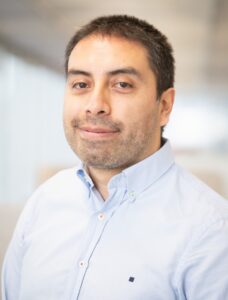At this year’s convocation ceremony, the MScAC program celebrates our 78 students of the 2021-22 cohort who graduate from the University of Toronto. Of our many talented students, we spoke with ten MScAC graduates who have shared with us their experiences during their time in our program, as well as their passions and motivations for pursuing the Master of Science in Applied Computing program.
The MScAC team congratulates all of our students who have been with us for the last 16 months. It’s been wonderful to see you all grow and we look forward to celebrating your future success with you. Welcome to the MScAC alumni family!

Undergraduate degree: BASc in Electrical Engineering
MScAC internship: CPP Investments
Current role: Associate, Investment Science at CPP Investments
Did you have any industrial experience prior to joining the MScAC program?
After my undergraduate degree at Queen’s University I worked in consulting for two years. I did electrical engineering, and then I knew I didn’t want to work in the field of electrical engineering. Consulting seemed like kind of a good way to learn about different industries and figure out what I wanted to do from there. But I think the biggest takeaway is that I really missed the challenging technical work that I got in my undergrad.
What initially made you apply to the MScAC program?
Reflecting on what I liked and didn’t like about my role in consulting, was that I really liked the hands on work of working with companies and seeing the impact my work can have. But then, what I didn’t like is the actual type of work I was doing, obviously like much more business focus. And I wanted to do something more creative and technical. So I really liked the machine learning work I had done in undergrad. So I always kind of knew that that was something I was interested in pursuing further, and so MScAC gave the perfect combination of the best of both worlds, in terms of getting to deepen my skills in computer science and machine learning, and then I also got the opportunity to apply those in industry.
What were your career goals prior to joining the MScAC Program, and have those changed at all?
I knew I wanted to work in machine learning research, but I was pretty open to the different applications. I didn’t really know in detail where I wanted to apply machine learning research and I also wasn’t too sure what the opportunities were.
The MScAC program gave me a ticket to experience so many rich opportunities to meet with different tech companies for me to learn what’s out there and what are the latest developments and different machine learning applications. Through this process I learned my passion and career goals lined up to finance and investing and I could explore working with some of Canada’s largest financial institutions thanks to the MScAC’s strong industry partnerships.
What were some of your favourite courses during the MScAC program?
One of my favourite courses at MScAC was Neural Networks and Deep Learning because while this course was really challenging, our professor Jimmy Ba did a great job teaching us the math and the foundations of the all the models that are being used right now in industry like transformers and neural networks. I found that having a very thorough understanding of those models really helped and develop my skills and make me better at my job today.
How do you think the MScAC program has helped you achieve your career goals?
The MScAC program has helped me tremendously from enhancing my technical skills in computer science and machine learning, while also helping me enter the world of tech innovation. It would have been really hard for me to have entered this industry with where I was at before starting the program, just with my level of experience and knowledge. So it was really good at at helping me grow and learn how to apply my newly gained technical skills in machine learning, data science, entrepreneurship, and more.
On top of that, the program has equipped me with the recruitment and interviewing processes when finding a company for my applied research internship. There’s no way I would have been able to have talked to and applied to and interviewed with as many companies as I did. And that process really helped me figure out what I wanted to.

Undergraduate degree: Integrated BTech and MTech in Mechanical Engineering
MScAC internship: Microsoft Turing
Current role: AI Specialist at the Vector Institute
Prior to the MScAC program, what was your educational background and industrial experience?
From the Indian Institute of Technology, Bombay I received a dual program undergraduate and master’s degree in mechanical engineering. After completing my program I worked at Deloitte (India) for three years where I used machine learning for business use-cases since my role was more on technology/coding side rather than consulting.
What made you apply to the MScAC program?
The whole motivation for me wanting to join the MScAC program was my fascination and passion for machine learning. I found that at Deloitte while I was working on traditional machine learning (ML) work and I was hungry to shift gears to become more specialized in natural language processing (NLP). I wanted to leave industry to transition to an applied research domain. I knew the MScAC program was perfect for me because I could have the best of both worlds to learn more about NLP through applied research.
What were your career goals prior to joining the MScAC Program, and have those changed at all?
For me, I think my career goals fit quite nicely to what I had actually received from MScAC. Prior to joining MScAC it was my goal to pursue applied research in the NLP space working on language models and the impact I can make. At MScAC I got that and more, especially during my internship at Microsoft Turing where I was working on an NLP specific project.
What were some of your favourite courses during the MScAC program?
My favourite MScAC courses were Natural Language Computing and Neural Networks and Deep Learning. Another course worth mentioning is Machine Learning for Healthcare with Dr. Rahul Krishnan because the coursework was challenging and our evaluation component was project based where we could apply research. I would take this course over and over again because I found myself learning so much through this style of teaching and evaluation. It was also interesting to see how machine learning is making progress in the healthcare domain.
What made you choose to pursue your applied research internship at Microsoft Turing?
For me, the biggest draw to Microsoft was their NLP project – I only had my eyes on Microsoft and their work in this field. I knew my interests and passions were aligned to Microsoft and so I prepped extensively for my interviews with Microsoft. I also consulted some MScAC alum for their advice while preparing as well.
What advice do you have for any aspiring MScAC students?
I’ll start by saying that MScAC provides you the platform to explore where your interests lie and to also explore these potential interested through hands-on experience. There aren’t many MSc programs structured like MScAC where you can leverage this opportunity to experience applied research experience with the best of the best industry leaders. And I’d also recommend that aspiring MScAC students take advantage of the many course offerings at MScAC because they are all taught by experienced professional and experts who you not only will learn from but also network with.
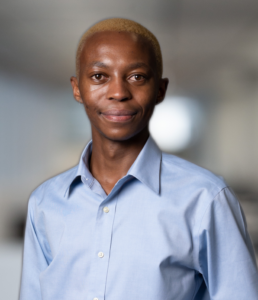
Undergraduate degree: BSc in Mathematics and Applied Mathematics
MScAC internship: CIBC
Current role: Quantitative Analyst at BMO
What made you apply to the MScAC program?
My background was in Mathematics and Applied Mathematics. I did a BSc and MSc at the University of Cape Town and I wanted to join the MScAC to pivot. I was loving math, but I wasn’t too sure if it was something I wanted to do. I’ve always been interested in more applied projects in industry and I wanted to explore that avenue more. When I came upon the MScAC program, I was drawn to not only their huge pool of courses taught by academic experts but also the opportunity to do applied research in industry. This was very appealing to me because I knew I would have creative opportunities to solve real-world problems.
What were some of your favourite courses during the MScAC program?
I really enjoyed Computational Methods for PDEs because it was the perfect balance of mathematics and computer science. The course took on a more applied focus in the sense that the component for evaluation was very like coding-based but it was also very theoretical. Overall, it was a very challenging course but it also taught me to be very diligent and to just strive for excellence.
What was your internship experience like being located in Toronto, North America’s third largest tech hub?
What I love about working in the city of Toronto is that it is such a competitive space where there is more investment in innovation and creativity to solve for real world problems. There is nothing like seeing novel research taking place and being well respected and invested in. During my internship I’ve found that there is always a push to do your best and be creative and this is something I’ve admired about the city of Toronto.
What were some of the highlights of your internship?
I loved the amount of responsibility I had and also the amount of room to be creative with that responsibility. So I think those two things combined demanded that I became this very self-driven person who was taking initiative at all times in the process, but also they kind of also allowed me to say “Oh, I’ve done something like this in the past, and maybe that should work and I could explore all the things that I think will work and see them through”.
My manager during my internship was very supportive, like we used to meet every week, and we would have discussions about progress and I would learn a lot from him – we thought in different ways. He was more data and results. And for me I was more like a bigger picture person and I think sometimes I would learn that you know the process itself is something that you can let guide you, so lots of growth and development.
What advice do you have for any aspiring MScAC students?
The program is competitive and the admissions process is thorough, and the people who are reading the applications want to know more about the students. To whomever wishes to apply to the MScAC program: just make sure that you highlight the things that make you stand out, especially if you know you’ve done any projects that you were proud of. And also just be yourself during your interviews. I think that was the thing for me, I was very nervous but I also told myself I have everything I can to offer and I am proud of that. And I think it went really well.
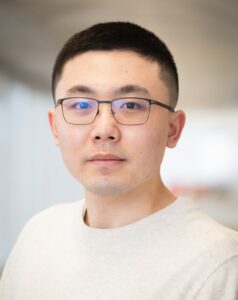
Undergraduate degree: BSc in Computer Science
MScAC internship: Unity Health Toronto
What made you apply to the MScAC program?
I applied to the MScAC program because it was the perfect opportunity to further my education in data science and artificial intelligence, which I am passionate about. The program’s emphasis on both in-depth theoretical courses and applied research in the real world was particularly appealing. Additionally, the MScAC program’s Data Science concentration aligned well with my career goal of becoming a Data Scientist.
Was there anything that you were hoping to get out of the MScAC program experience that you hadn’t necessarily experienced before?
I was looking forward to gaining more practical experience in data science, working with real-world cases and collaborating with industry partners during the MScAC program. I also wanted to learn how to better communicate and collaborate with others, both within and outside the field of data science, to solve complex problems and create a positive impact.
What was your internship experience like?
My applied research internship focused on predicting bed capacity shortages in hospitals using machine learning models, as well as estimating emergency department wait times at St. Michael’s Hospital. By strategically aggregating external government data and internal hospital data, we were able to improve the prediction accuracy by 20%. This research had a direct impact on hospital operations, as our models were integrated into the hospital operations center dashboard, resulting in improved efficiency and resource allocation. Ultimately, this contributed to better patient care and outcomes.
I chose to work with Unity Health Toronto for my internship because of its strong reputation in healthcare and its commitment to leveraging data science and machine learning techniques to improve patient care. I was excited about the opportunity to apply my skills in a meaningful way and contribute to the betterment of healthcare services.
What were some of the highlights of your internship?
Two of my biggest highlights during my internship and time at MScAC were successfully completing my project and making a tangible difference in the lives of patients by helping improve hospital operations and resource allocation and also being awarded the Student Innovation Reward at the Applied Research in Action (ARIA) showcase for my outstanding applied research project.
What are some of the goals you hope to accomplish now that you’ve graduated from the MScAC program?
My goals as an MScAC alum include continuing to grow professionally, staying up-to-date with the latest trends and advancements in data science, and leveraging my skills to make meaningful contributions to the organizations I work for. I also aim to build a strong network with my fellow MScAC alumni, engage in lifelong learning, and ultimately become a well-respected leader in the data science field.
“Leaving industry to pursue a masters degree at MScAC has been a complete game changer. Studying in Toronto where AI is booming has given me the opportunity to understand how the fundamentals can be applied to solving complex problems.”
Undergraduate degree: BSc in Mechatronics Engineering
MScAC internship: Tenyks
Did you participate in any research opportunities prior to joining the MScAC program?
Yes, my first research-based experience was spent one year I went for one year to Germany. I studied for six months there and then I did one R&D internship there for Bosch, which is one of the largest global manufacturing companies who have entered the automotive space as well.
Did you have any industrial experience prior to joining the MScAC program?
Yes, I worked for about seven years at a company that I founded. It was a payments company based in Mexico City where we started with two employees and grew to about 35 by the end of 2019. I gained a tremendous amount of experience from how to build a team and how to manage people. However, while I had a technical background, I didn’t have the chance to go a step deeper and build a product from the beginning to the end, which is something I would have liked to have explored.
What made you apply to the MScAC program?
Initially I was still deciding between two industries to tap into to upskill and evolve myself into further: Crypto and AI. I chose to pursue my passion of AI because it’s something I enjoy learning about and haven’t had too much experience with it in my previous research and industrial experience. I had looked at all the available MSc degrees that were out there globally and which ones had world-renowned AI focused curriculums. The city of Toronto came up as a booming tech hub for all things pertaining to AI and it was an easy choice from there. Receiving a master’s degree from the first ranked university in Canada and to study and gain industry experience in AI in the city of Toronto was a sure bet.
What were some of the highlights of your internship?
During my time at Tenyks, an MScAC classmate and I were able to see our research paper become published, which was really really cool. We were able to first jump into gaining an applied research experience at Tenyks, but while we were researching we were able to see our paper come to fruition. To me that’s been the most important and rewarding thing is seeing that the research we’ve conducted being turned into something that can help solve a problem for others. Having the chance of seeing the full cycle of an idea, of our research idea or prototype and seeing that on paper in a venue in a conference, that was an incredibly rewarding journey.
What are some of the goals you hope to accomplish now that you’re a fully graduated MScAC alum?
My main goal now as an MScAC alum is to start a second company in the AI domain. Initially before joining the program I wanted to learn the fundamentals of AI, which is a hard and broad topic. I’ve successfully done this and have learned even more than I could have imagined and while I can’t say that I am a full-fledged expert in AI or machine learning, I can confidently say that I learned so much more that I can carry with me to start my own company and become a world-class innovator.
What advice do you have for any aspiring MScAC students?
I feel like the best that you can do when you arrive here is to take advantage of all the opportunities that the MScAC program, Department of Computer Science and University of Toronto have to offer. There are only so many things that you can read if you just stay in your room or stuck on Zoom all day – you miss too many things that you can experience first hand. It is important to get out there, attend the MScAC events, sign up for a few lectures, visit a few exhibitions. There are many, many, many things that you can find on campus that will get you exposed to diversifying your knowledge and confidence to tackling and solving the biggest challenges the world faces.

Undergraduate degree: B.Tech in Computer Science
MScAC internship: Recursion
Current role: Machine Learning Engineer at Recursion
Did you participate in any research opportunities, prior to applying to MScAC?
During my undergraduate degree in Computer Science at Vellore Institute of Technology I had done plenty of research opportunities. For instance, I went to the French National Center for Scientific Research (CNRS) to pursue my undergraduate thesis working on developing EEG Models in neuroimaging and AI Labs. I’ve also worked at a NeuroPoly, a research unit based in Montreal that specializes in neuroimaging, where I was working towards developing an open source segmentation software.
Was there anything you were hoping to get out of the program that you hadn’t necessarily experienced before?
There are plenty of things I got out of the MScAC program! First, having different perspectives on research, where initially I used to think research would be at bigger conferences or venues often unstructured and unobtainable. At MScAC, I’ve learned that research is more structured and oriented, rather than being huge and completely uncertain.
Besides that, I massively took part in teaching assistant ships, got to interact with students, and through that improve my communication skills and simplifying complex topics with undergrads, so that I could understand them better first, and then teach them in a simplified manner. So these were some experiences which are very unique, and I hadn’t experienced before.
What were some of your favourite courses during the MScAC program?
One of my favourite courses was Machine Learning for Healthcare because it provided a very real perspective of how machine learning operates in the healthcare sector, not only in the clinical settings, and production, but also in the industrial based research. It’s a seminar based course, so you can deep dive into a specific topic and work further on that. This was being taught by Assistant Professor, Dr. Rahul Krishnan who is a great mentor and researcher in this field.
How do you think the MScAC program has helped you achieve your career goals?
For me, a big part of the MScAC program’s help in setting me up for success to achieve my goals as been the MScAC alumni community. These past students and the MScAC program team who have been such great resources, mentors, and friends. They’ve orchestrated such an experience for us that has set us up to stay truly connected to, not only to the research of academia, but also to the industry. So that’s pretty interesting.
I’ve even taken advantage of the many MScAC events the program organizes throughout the year, such as the MScACtalks which bring various perspectives on emerging and trending topics from industry and academic leaders. I’ve found these MScACtalks have helped me to understand better a broader cross-sectional perspective and has helped me to hone my technical skills so i can achieve my next future career goals.
What was your internship experience like?
My internship experience was nothing less than amazing! Toronto has almost all the growing health care companies and it lines up with my career goals. At Recursion I was working towards building a foundation models tool. In healthcare this is very complex challenge to tackle but it’s importance to society is that instead of developing, let’s say target specific drugs which are used in the drug development program, we can develop a target agnostic techniques which will benefit the humanity and society in general and also it can incorporate multimodality which is very useful.
What advice do you have for any aspiring MScAC students?
I have two big takeaways and pieces of advice for aspiring MScAC students:
-
Try to find what you love and try to work on that rather than trying to do everything because this AI landscape is growing massively every day. Some revolution is coming in AI industry – you can’t keep up with anything and everything you have to find what you’re interested in and what you like and dive deep into that.
-
Be bold and take risks. There are a lot of opportunities which a lot of students miss because they try to be in their comfort zone during their masters and take the courses which they feel they can easily ace. The goal is not just to enhance your previous knowledge, but also to build upon or extend what you can do outside of what you already know. So there are amazing opportunities here at MScAC. You might not even know what’s out there if you don’t go out and network and put yourself out there.

Undergraduate degree: BSc in Computer Science and BHSc in Health Sciences
MScAC internship: Bank of Canada
Current role: Full-stack Developer at the Bank of Canada
What were some of your favourite courses during the MScAC program?
Some very interesting courses at MScAC were Introduction to Machine Learning and Neural Networks and Deep Learning because they focused heavily on math, which is one of my favourite subjects. My favourite course though would have to be Computing and Global Development, which was taught by Assistant Professor Ishtiaque Ahmed. I absolutely loved the course content, the course structure and the tech aspect of it. This course also had a public health lens to it, which integrated both of my interests in technology and health sciences.
What was your internship experience like working in Toronto, North America’s third largest tech hub?
I could not speak more highly of it! My internship was at the Bank of Canada and I worked with Dave Campbell, Assistant Director of Data Science Applications at Bank of Canada & Professor at Carleton University and Naveen Rai, Senior Economist at Bank of Canada. Needless to say, I had great colleagues to work with and learn from. It was an excellent collaborative experience between people with different expertise and backgrounds.
I also have to say, the entire MScAC team was a constant source of support throughout the whole program, and the way they checked in to make sure everything went well during our internships enhanced the entire experience.
What were some of the highlights of your internship?
Not only was it an incredible experience gaining applied research experience in the financial sector with Bank of Canada, but to have a big stage at the MScAC program’s Applied Research in Action (ARIA) showcase where I could present all my hard work to such a large audience was amazing. This is the biggest event of the year with over 500 attendees ranging from faculty, alumni, industry leaders, government, and more. I loved being able to interact and network with everyone in attendance and for them to show their interest in my hard work.
How do you think the MScAC program has helped you progress in your career?
It really helped me solidify my technical and theoretical understanding of machine learning. The program courses were very rigorous and challenging but they also gave me insight and access to learn cutting-edge advancements in a rich variety of fields. What I’ve noticed in my current role now is that having that theoretical foundation, in addition to the applied research in industry experience, has given me a much deeper understanding of how I can apply my learnings to solve real-world problems.
What advice do you have for any aspiring MScAC students?
That’s a good question and I’d have to say that my time at MScAC has gone by so quickly because I’ve enjoyed it so much from not only an academic and professional standpoint, but from a social and community building standpoint as well. As a cohort we learn together from the best of the best, so my advice would be to enjoy the time you have at MScAC because it really does fly by.

Undergraduate degree: BSc in Computer Engineering
MScAC internship: SOTI
Current role: Data Scientist, SOTI Aerospace
Prior to the MScAC program, what was your educational background?
As a driven and curious student, I pursued my undergraduate studies in computer engineering at Sharif University of Technology, immersing myself in the captivating world of coding and data analysis. With each semester, I soared academically, solidifying my position among the top students. However, my desire for knowledge led me to research Deep Learning at Technical University of Munich in Germany. This was a turning point in my life, as I got the chance to work with one of the most prominent professors in Computer Vision.
What made you apply to the MScAC program?
After consultation with my supervisors, I came to the conclusion that my endeavours will be all in vain unless I study at a graduate program that provides applied research-based internship opportunities because this would allow me to advance my experience and application in research, observe the challenges that high-tech companies encounter and build my network.
The University of Toronto is world-renowned for their cutting-edge advancements in science and technology. The Department of Computer Science at U of T is also an internationally recognized and top ranked department, thus, I knew that studying at this prestigious institution and it’s MScAC program at the Department of Computer Science will undoubtedly provide me with the right knowledge, skills, and experience to pursue my dream, becoming a world-class entrepreneur in the field of Computer Science.
What was your internship experience like?
During my internship at SOTI, a leading tech company in Toronto, I had the incredible opportunity to dive into the fascinating world of robotics. The experience was nothing short of transformative, igniting my passion for cutting-edge technology and pushing the boundaries of what I believed was possible. I chose to work at SOTI for their reputation as a leading company in the field of software development was a significant factor. SOTI has been recognized for its innovative solutions and its commitment to pushing the boundaries of technology.
What are your upcoming goals you hope to accomplish now that you’re a fully graduated MScAC Alum?
I have set several goals that I aim to accomplish. Firstly, I aspire to apply the knowledge and skills I gained during the program to make a significant impact in the field of applied computing. Whether it’s through research, innovation, or practical implementation, I want to contribute to solving real-world problems and advancing technology.
Furthermore, I have a strong desire to take on leadership roles and make a positive difference in the organizations I work with. I want to lead teams, drive innovation, and create an environment that fosters growth and excellence. Whether it’s through entrepreneurial ventures or working in established companies, I aim to contribute to the success of the organizations I am associated with.
What advice do you have for any aspiring MScAC students?
-
Embrace the interdisciplinary nature: The MScAC program brings together students from diverse educational backgrounds, which creates a rich learning environment. Embrace this interdisciplinary nature and take advantage of the opportunity to collaborate and learn from your peers.
-
Make the most of research opportunities: The program offers valuable research opportunities with esteemed faculty members. Take the initiative to explore areas of interest, and seek out research projects that align with your passions.
-
Network and connect with industry professionals: The MScAC program provides excellent industry connections and networking opportunities. Attend guest lectures, workshops, and networking events to meet professionals in your field of interest.
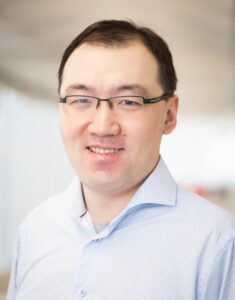
Undergraduate degree: BSc in Computer Science and BEc
MScAC internship: DNEG
Current role: Associate Researcher at DNEG
What made you apply to the MScAC program?
I applied to the MScAC program because I was looking for the opportunity to not only acquire a professional degree in Applied Computing from a prestigious university, such as the University of Toronto, but to also join a program that shapes me to tackle and solve real-world problems. The MScAC program’s applied research internship was the answer to what I was looking for to help me achieve my goal of wanting to conduct cutting-edge applied research that will help make a positive impact in the world.
What were your career goals prior to joining the MScAC program? Have those changed at all?
Initially my career goal was to explore becoming a Software Development Engineer, however, since joining the MScAC program, this has shifted to a Research-oriented Engineer. Software development engineering is a fantastic career to pursue in this industry and world, however, I’ve learned that this path does not challenge and demand enough from me. The MScAC curriculum in Artificial Intelligence has exposed me to gain a deeper theoretical understanding as well as greater appreciation for how I can use AI to solve complex real-world problems. Thanks to my rigorous and impactful MScAC course curriculum, I’ve come to the realization that I would like to now pursue a career in research-oriented engineering.
What was your internship experience like, especially working in Toronto, North America’s third largest tech hub?
Overall, I can feel and see AI is blooming in North America’s third largest tech-hub – Toronto. This city is one of the dominating force in the tech industry right now and it is at the front line of this rising tide. Toronto has many opportunities in AI research and the Ontario government is supporting students and companies by providing funding to research further how AI can help us solve ongoing in the real world.
What made you choose to pursue your applied research internship at DNEG?
My passions have always lied in films and video gaming, so I decided to explore working with a company that focused their research on my passions. Knowing that DNEG is an established and renowned industry leader in film and visual effects (VFX), I decided to apply to DNEG’s applied research internship. With DNEG I knew I would discover how applying AI solutions in this industry would make an impact on real-world problems. Moreover, I choose to work at DNEG because I appreciated their working environment for my personal desires of conducting independent applied research. DNEG provides researchers with the opportunity to explore an environment where they can maximize their autonomy while still learning from and working with expert leading supervisors and researchers.
How do you think the MScAC program has helped you achieve your career goals?
Being a student and now alum of the MScAC program at the University of Toronto I am immersed in a well-connected network of world-renowned academics, researchers, and industry leaders. Learning is a lifetime process and being a part of this community at U of T is one of the best incubators of greatness. I have set myself up for future success because I have this access to the world’s best thought leaders who I can turn to, to help me advance my knowledge and career. I am truly honoured to be a part of the MScAC Alumni and look forward to staying in touch and networking with everyone.
What were your favourite memories of the MScAC program?
I love my fellow classmates, my professor and the entire MScAC program team. I changed and began to enjoy socializing after I joined the MScAC program. For instance, one of my classmates has now become my colleague at DNEG and she is like a younger sister to me – she is intelligent, patient and passionate. My supervisor, Professor Lindell has also been great throughout my time at MScAC. He has always been humble, respectful and a great mentor holding weekly meetings to offer insightful advice. Moreover, the program administrative team, such as Claire and Susan have been so genuine and supportive with each and every one of us. They were especially incredible while I was stuck in the U.S. alone during the pandemic, helping me with my deferral and my scholarship. I never felt such heartwarming sincerity after I left my hometown.
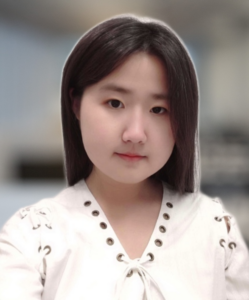
Undergraduate degree: BSc in Computer Science and BA in Psychology
MScAC internship: DNEG
Current role: Associate Researcher at DNEG
Prior to the MScAC program, what was your educational background and industrial experience?
During my undergraduate George Washington University, I double majored in psychology and computer science. I was always fascinated by the intersection of technology and the human mind, so I chose disciplines that were both passions of mine to learn more about.
Prior to joining the MScAC program I interned at two companies that specialized in games and gamified educational software. I’ve always been interested using technology to facilitate creative expression so I decided to pursue industrial experience in gamification where I can help artists create a live interactive experience.
What made you apply to the MScAC program?
During my undergraduate degree I found that I hadn’t gained the applied and technical skills I would have liked to have had to grow my career. I had also realized that I really enjoy solving real life problems and building solutions that can be used by others around me. When I came across the MScAC program I knew that getting my masters degree at the best university in Canada, I would not only gain that applied and technical industrial experience, but I would also live out my passion of solving real world problems. This program is the best of both worlds for me!
What was your internship experience like?
I chose to complete my applied research internship at DNEG because it is one of the largest commercial companies you can work for in Toronto that works on the most cutting-edge visual effects and animations for the creative industry. At DNEG there are many talented artists passionate about creating the most stunning visual effects we can see today. To be able to work with fellow researchers to help artists realize their creative vision brings me a lot of joy.
What was your applied research project about and how does it contribute to solving real-world problems?
My research at DNEG focuses on facial animation. Every realistic and complex face you see on the silver screen is created by artists using a set of simple, atomic expressions called blendshapes. These blendshapes are in turn hand-crafted by modellers using captured video or images of the actor as reference. And because faces are very complex shapes, sometimes they need hundreds of these models for one person. So ideally we would want to automate the generation of these shapes to save time – my research was focused on this automated generator of blend shapes.
How do you think the MScAC program has helped you achieve your career goals?
It’s really helpful to have been a student of the MScAC program because it gave me a platform that allowed me to explore a wide range of different academic and industrial opportunities I wouldn’t have had access to on my own. The program allowed me to pivot to a more applied research focused direction where I’ve built the theoretical and technical knowledge to grow my career and connections in the tech industry. I’ve also met such motivating classmates who have pushed me to think in different ways and I’ve been mentored by many incredible University of Toronto faculty and industry leaders. It’s been an awesome program to help me grow as a world class tech innovator.
